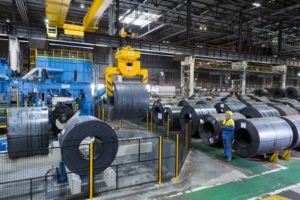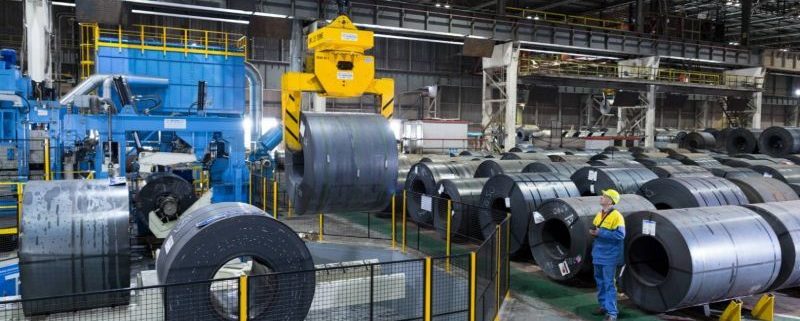The Bishop of Oxford, the Rt Revd Steven Croft, spoke in the House of Lords today on the role of education in building a flourishing and skilled society. The debate was proposed by the Lord Archbishop of Canterbury, Justin Welby.
Posts
 I made a visit to Tata Specialist Steels in Stocksbridge in October. I met with the senior management team for an overview of the business and then I was taken on a tour of the plant and the steel rolling mill.
I made a visit to Tata Specialist Steels in Stocksbridge in October. I met with the senior management team for an overview of the business and then I was taken on a tour of the plant and the steel rolling mill.
It’s only my second tour of a major steel works and, once again, it was an unforgettable experience. The steel arrives as huge cylinders, newly smelted from scrap metal in the firm’s Rotherham plant, twice as tall as a man and more than twice as wide.
We walked through and over the length of the steel rolling mill. The cylinders of steel are first heated to high temperature in furnaces, then lifted out by huge cranes and transferred one at a time to the rolling presses. Enormous force squeezes them into new shapes, like a child working an enormous piece of plasticine. Each time the metal goes through the press it becomes longer and thinner, up to sixty or eighty metres depending on the order. The ends are trimmed to the right length and the new piece of steel is then transferred to the cooling racks.
At a later stage these huge pieces of steel will form the raw material for aeroplane parts, car engines, oil and gas drilling equipment, and high end stainless steel instruments.
The pressing was controlled from a hi tech area called a pulpit. Imagine my delight at the name. It’s a high tech control tower, high above the steel, where about ten men pass the molten steel from one machine to another with immense skill.
The prophets of the Old Testament spent time in the forges of their day, watching the furnaces and the hammering of metal. The process of forging iron was a source of wonder then as now. It became an image of God’s power and also of purity and holiness.
“Is not my word like fire, says the LORD, and like a hammer that breaks a rock in pieces” (Jeremiah 23.29)
“For God is like a refiner’s fire and fuller’s soap” (Malachi 3.2).
These images are important to us and so is our modern steel industry. Sheffield and Rotherham are known all over the world for the manufacture of steel. Steel is a vital part of the economy and the history of the region and has shaped who we are.
I learned afresh during the visit that the steel industry faces huge challenges. The week before I went to Stocksbridge, SSI UK announced the closure of the steelworks in Redcar with the loss of 1,700 jobs. Just last week, Tata Steel announced major redundancies at its works in Scunthorpe. The Stocksbridge plant is already reducing its workforce further. These closures and job losses carry terrible consequences for individuals and communities.
I was impressed by everything I saw in my visit to the Stocksbridge plant. The management have energy and vision. The apprenticeship programme is exemplary. The product is superb. The workforce is committed and skilled. There has been extensive investment for the future.
But the steel industry faces global challenges. The demand for steel in China has dropped so cheaper Chinese imports are flooding the market in Europe. Energy costs for manufacturers in Britain are significantly higher than in Germany. This is a very critical time for the British steel industry.
I took part in a debate in the House of Lords on 3 November on energy strategy for the future. Throught this I wanted to raise awareness that the government need to do something very rapidly now to level the playing field in terms of energy costs for the UK steel industry (the full text of my speech is available here). Many others are raising similar concerns.
The steel industry is an immense part of our heritage and our economy in this diocese. Churches need to understand what is happening, support those involved and help their voices to be heard in this present moment.
My Lords,
May I from these benches warmly welcome the Sustainable Development Goals and the government’s commitment to them.
Like others I was initially somewhat sceptical about a document which contains 17 goals and 169 targets. These are not even memorable or round numbers. I have to say, however, I am inspired by the single vision for our world which drives and shapes these goals. That vision is set out in the ambitious declaration which forms the preface to the draft document to be considered and I hope agreed at the September summit.
The language of the declaration is lofty and rightly so. I quote: “Never before have world leaders pledged common action and endeavour across such a broad and universal policy agenda”. And again, “We can be the first generation to succeed in ending poverty just as we may be the last to have a chance of saving the planet”.
The vision in this document of sustainable development, a safer world with more resilient institutions where no-one is left behind is one that is consistent with the Christian tradition and those of the major world faiths. I applaud it, believe it and support it.
However it is a vision which needs to be communicated well and implemented with rigour and it is here I want to focus my remarks.
The single vision is broken down in the report into just five areas of critical importance. These five areas are easy to name, to remember and to communicate: People, planet, prosperity, peace and partnership. Preachers love alliteration.
I would encourage the government to place real weight on these shorter, more memorable and more accessible headings, for this reason. These visionary goals for our world will only be realised as they are widely understood and communicated. This vision will never be realised if it is the vision only of politicians and NGO’s. It must become the vision of all the majority of people on the planet, a shared vision of prosperity, peace and partnership. The goals need to be spoken of in schools and universities and in the media. There needs to be international debate. Resources need to be invested here and elsewhere in education and building awareness of the values which underpin this vision which are no longer self evident in our society or across the world.
My Lords I was a member a few years ago of the city wide fairness commission in Sheffield. I assumed at the beginning of the process, that fairness would be a shared concept among the population, that we were articulating a common vision. On the day of the report’s publication I appeared on local radio. The phone in responses revealed that my assumption was wide of the mark. A big vision and detailed targets are both excellent but in between comes the harder task of transforming human attitudes and building deeper generosity of spirit: explaining the reasons why we seek a better world for all. The churches and faith communities have a key role here. We understand we are global citizens. We share the deeper values which lie beneath these goals.
To quote from the report again: “…we are setting out a supremely ambitious and transformational vision. We envisage a world free of poverty, hunger, disease, and want where all life can thrive….a world in which every woman and girl enjoys full gender equality….a just, equitable, tolerant, open and socially inclusive world in which the needs of the most vulnerable are met….a world in which consumption and production patterns are sustainable”.
This vision is worthy of agreement and it is worth sharing and communicating throughout our nation and beyond it. I hope the government will take this responsibility seriously.
It is also a vision which calls for clear plans for implementation. Here I would encourage the government to pay careful attention to the plans for enacting this ambitious programme and for scrutiny and review.
May I therefore ask the Minister two specific questions:
Will the government commit to promoting the vision of the SDGs and to implement the agenda in this country in full. If so how do you plan to do this?
How will the government use the high level summit to build support for an ambitious global climate change agreement in Paris in November and December. If so what link does the minister see between the two summits?
We all listen more to those who practise what they preach. The government’s rhetoric on climate change in the manifesto for the election was good. The government’s record on climate change since the election is a cause of concern to many, myself included.
The independent Climate Change Committee have already raised the issue of a gap between the policies already in place and the policies needed to meet the climate change the government supports.
Many were therefore expecting a series of positive policy announcements to close this gap. Instead, the gap seems to be widening. The government has cut subsidies for solar and wind power, privatised the Green investment bank, is getting rid of the Green deal, has lifted the ban on certain harmful chemicals and has introduced a tax on electric cars.
Can the Minister confirm that the government will continue to hold to its commitments and support the positive and transformative vision of the Sustainable Development Goals with consistent, prompt and long term action especially on climate change?
+Steven Croft
17.9.15


